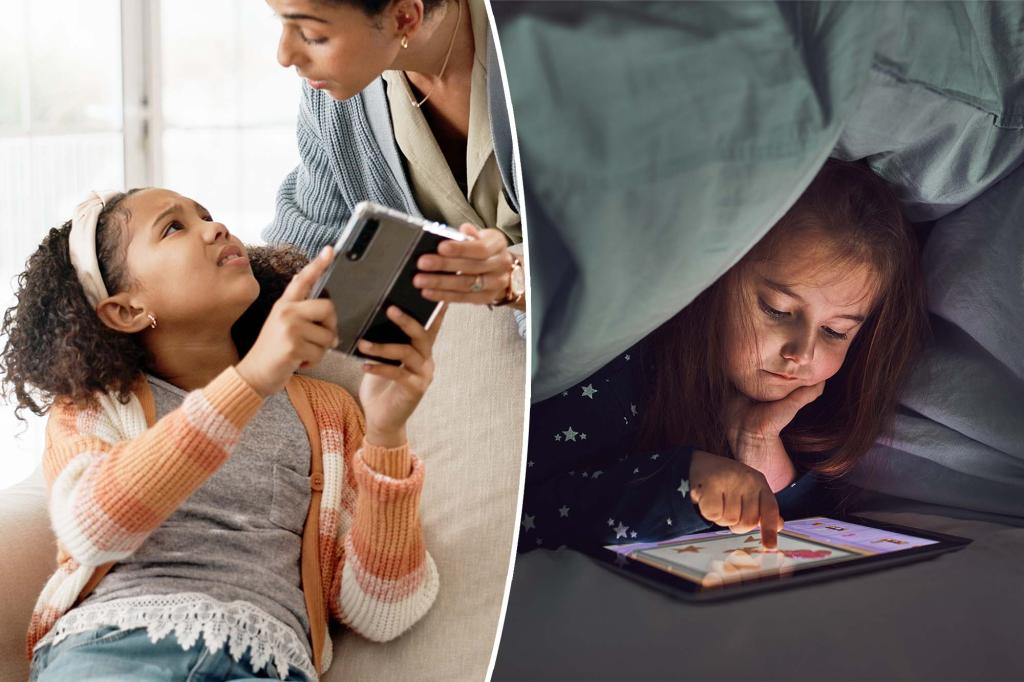Parents spend approximately 96 hours fighting with their kids over screen time every year.
This staggering statistic means hundreds of fights between parents and children are induced by modern technology.
That’s according to a new survey of 2,000 parents of children in kindergarten through fifth grade, which aimed to investigate how screens can impact child-parent relationships.
Behind these conflicts lies a deeper concern: Two-thirds (67%) of parents fear they’re losing precious moments with their children due to screen addiction.
Even more concerning, 41% of parents said they’re afraid they’re losing their little ones’ childhood to technology completely.
The study, conducted by Talker Research on behalf of AngelQ, an age-appropriate browser for kids, revealed parents’ biggest concerns about their children’s online lives include exposure to online predators (51%), accidental exposure to inappropriate content (46%), and screen addiction (45%).
Other significant worries include cyberbullying (44%), children looking up content that isn’t age-appropriate (40%), negative social media influence (37%), and negative impacts on mental health (37%).
About three in five parents (61%) worry that too much screen time is replacing important elements of childhood development, such as building strong social skills and empathy.
Six in ten parents who allow their children to use the internet said their time online is spent unsupervised.
“This survey demonstrates how technology is currently aligned against families instead of allied with them,” said Tim Estes, CEO and Co-Founder of AngelQ. “Our kids are losing years of their childhood – precious time they’ll never get back – to exploitative products that addict them. We believe technology should educate and empower, not distract and divide families — and that starts with giving parents easier tools to manage screen time without the daily struggle.”
Parents reported concerning side effects from excessive screen time, including irritability (27%), mood swings (24%), and full-on tantrums (22%).
Other ripple effects included decreased attention span with offline activities like homework (19%), high levels of anxiety (14%), and trouble sleeping (14%).
Children are finding increasingly sophisticated ways to maintain their screen time, with parents discovering their kids sneaking devices behind their backs (39%), accessing completely different devices (20%), and changing the controls or permissions without their parents’ knowledge (18%).
Other workarounds included children exploiting “emergency” or “educational” modes (15%), creating new user accounts (13%), and using Siri or voice commands to open apps (13%).
When children resist turning off an internet device, parents admit to giving in 65% of the time. Gen Z parents, more than any other generation, said they gave in “often” (28%).
“This pattern of resistance and surrender creates a power dynamic that undermines parental roles and reinforces screen-dependent behavior in children,” said Estes.
These conflicts are most likely to occur leading up to dinner (64%), disrupting important family bonding time.
The most common disagreements center on the length of allowable time (43%), the types of content or apps kids can access (18%), and required parental approval for watching videos or games (18%).
Half of parents (52%) who allow their children to access the internet said they wish they had waited longer before giving their kids access to internet devices.
This regret was most prominent among Gen Z parents (63%), compared to millennials (53%) and Gen Xers (50%).
Many parents’ approaches to screen time are influenced by their own childhood experiences with technology, with 34% saying it affected their parenting style and choice to limit their kids’ access to the internet.
Despite these challenges, parents acknowledged positive aspects of screen time, including watching their kids explore their interests (60%), access to educational content (59%), the ability to learn lifelong digital skills (58%), increased inter-cultural awareness (25%), and the opportunity to connect with other like-minded children online (24%).
“These findings highlight the delicate balancing act parents face, wanting to protect childhood while also preparing kids for a digital world,” added Estes. “We recognize that screen time isn’t inherently bad, but today most of the options are. We want to reimagine how kids use tech to create healthy habits that enable young people to dream up ideas and create them in the real world. We’re committed to helping families set boundaries that work, so technology remains a tool for enhancing childhood, not taking away from it.”
Survey methodology:
Talker Research surveyed 2,000 parents with children in kindergarten through fifth grade; the survey was commissioned by AngelQ and administered and conducted online by Talker Research between March 7 – March 11, 2025.
Read the full article here

